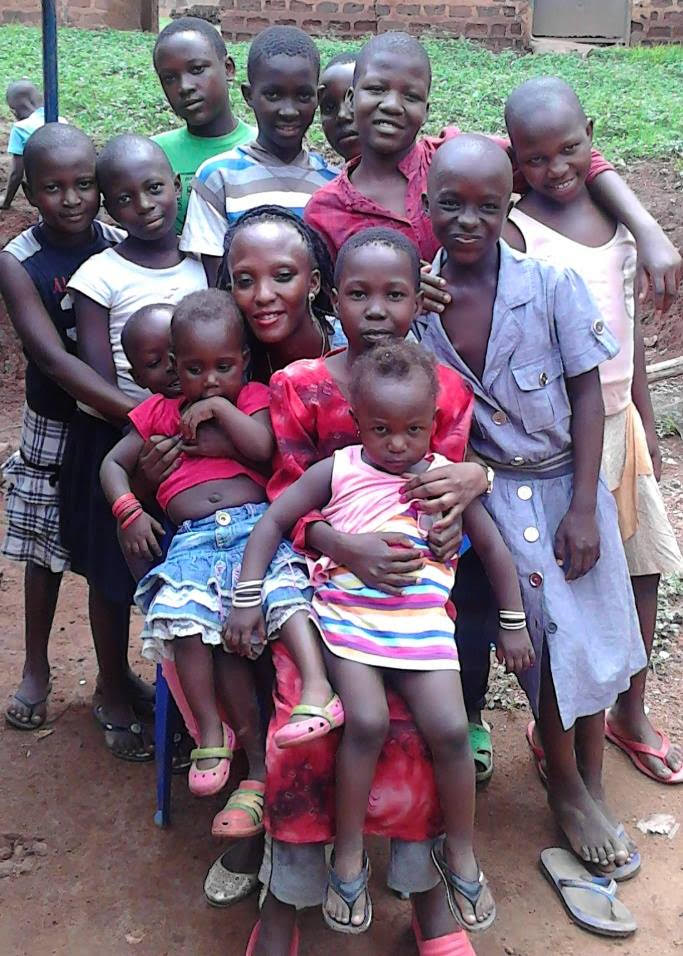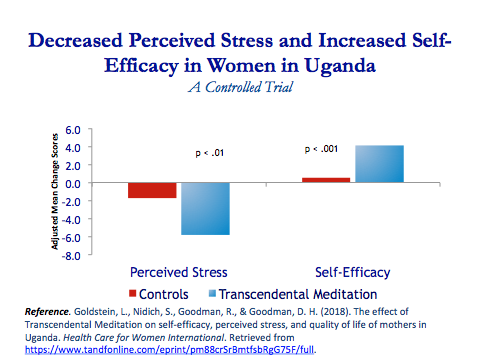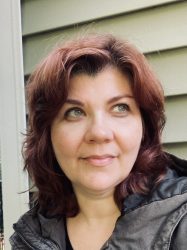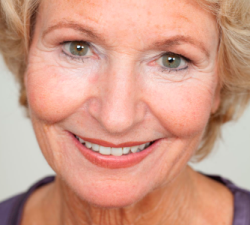Transcendental Meditation Empowers Vulnerable Women in Uganda—Stories and Research

Uganda is not an easy place to be a mother. Most of the nation’s illiterate and chronically poor are women, and in urban centers such as the capital city of Kampala, 40 percent of the chronically poor households are headed by women. Either widowed or abandoned, these vulnerable and often illiterate mothers are left to provide for their children without skills or opportunities for work.
Nakelembe Brenda saw the plight of women in Uganda firsthand—while helping her own single mother support five children in the slums of Kampala. At the tender age of eight, Brenda vowed to find a way to help women like her mother, who typically marry and start a family in their teens.
In a country where very few girls are able to become educated, Brenda overcame many obstacles in order to attend school, even when it meant skipping food for an entire day. In 2001, at age 22, Brenda founded United Women Platform for Empowerment and Development (UWOPED), a non-profit dedicated to empowering vulnerable women in Kampala and beyond.
At first Brenda thought of empowering women by teaching them skills. “These young mothers are mostly uneducated and unemployed,” she says. “So I thought that they could learn a trade and become job creators, and that would help them support their families and send their children to school.”
With her usual determination, she set up classes in tailoring, soap making, mushroom growing, hairdressing, and computer training.
“But the response was very low,” Brenda says. “The women would say, ‘We don’t think these skills can really help us because we have too many problems.’ Or ‘We can’t concentrate enough to learn these skills.’ These women were overwhelmed with stress, worry, fatigue, insomnia, depression, and ill health. They felt hopeless and couldn’t think clearly or focus on making their lives better. We had to work very hard to get them to participate at all, and then the majority wouldn’t continue.”
Brenda realized that she had to think of empowerment in an entirely new way. Then in 2012 she learned the Transcendental Meditation technique, which has been shown in hundreds of research studies in peer-reviewed journals to relieve stress, reduce PTSD and to raise self-esteem and productivity.
“Practicing TM helped me to stop wasting my time on worrying and to channel my energy into my work, to be more creative and recognize new opportunities, to become more patient.” Brenda says. She realized that this was exactly what the women of UWOPED needed in order to change their destinies—empowerment from within.
Partnering with Judith Nassali, the National Director of African Women and Girls Organization for Total Knowledge (AWAGO), Brenda arranged for a group of sixty women to start TM. The program took off, and now over 600 mothers at UWOPED—and 300 of their children—have learned the TM technique.
And the results were startling, to say the least.
Women who were too stressed and isolated to leave their homes are now running their own businesses, earning money to send their children to school. Twenty have become elected leaders in the women’s councils of their communities.
Let’s hear the stories of three women whose lives were transformed through TM and UWOPED skills training, and find out how they became part of a research study on self-empowerment.
She Became a Community Leader
At age 45, Jalia is the mother of ten children and grandmother of 15. She has raised her children with little help from her husband, who moved to another city and started a new family with a new wife. Like any mother, she wanted to feed and clothe her children and send them to school, but she had no skills, having started her family as a teenager herself.

Nakalembe Brenda and the children of UWOPED
“I learned TM for many good reasons,” says Jalia. “I used to be so rough and tough on my children, because I had so much stress to take care of everyone. After learning TM, I realized that I had to instill love in my family and find a better way to handle them and communicate with them.”
After learning TM, Jalia also realized that she had to find a skill to empower her to take care of her family. She learned tailoring at UWOPED and now makes quilted bags (purses), clothing and bathing sponges and sells them. She saved her earnings and now owns her own sewing machine and can work at home to support her family.
“Before I learned TM, I didn’t believe in myself,” she says. “I didn’t have self-esteem.” But now she has been elected head of the women’s council for her village.
“I figure that I was able to do that because I was empowered and believed in myself,” says Jalia, “and this made it possible for me to speak out and to do something to help other women in my village.”
What does self-empowerment mean to Jalia? “It means being in a situation whereby you can do something for yourself, so you can take care of yourself and your family and be independent.”
She Overcame Worry and Fear
A 35-year-old mother of two whose husband lives in another city with another wife, Namabiru Sarah was consumed by worry about how to provide for her children. “I worried so much that it brought on a lot of diseases like frequent headaches,” she says. “I felt weak and sick because of the worrying.”
Fearful to leave her home, she couldn’t find the courage to ask for a job or even to express herself to others. “I felt alone and isolated, filled with self-hatred,” she says.
Since starting TM, Sarah’s life has changed dramatically. “Now I no longer get sick like before,” she says. “I feel that I can handle problems and can stay strong no matter what the problem.”
“Before, UWOPED had offered me the opportunity for learning tailoring,” she explains. “But until I started TM, I didn’t understand the meaning of that opportunity because I was always worrying and afraid.”
Her fear has been replaced by self-confidence and self-esteem. She now sews dresses and other clothing items. She even learned to use a computer to help her with her business and daily life, and now earns enough to send her children to school. She says, “I used to be so tough on my children but now I’m calm.”
Perhaps best of all, she has come out of isolation and even was elected to the women’s council for her area. “I’ve made a lot of new friends, friends who are good to me and give me a lot of good ideas.”
What does self-empowerment mean to Sarah? “Self-empowerment is something big for me. To me it means improved creativity and self-esteem. Instead of worrying and fearing, since learning TM I have become creative, and can come up with ideas to take care of myself and my children.”
Her Brain Woke Up
Nankya Helen has a light, laughing voice of a teenager, but she is 40 years old.
“Before I started TM I was stressed all the time because of the challenges at home,” says Helen, a mother of four who also cares for her ailing husband.
“I used to lose my temper so quickly,” she says. “If my kids did anything I didn’t like, I would quarrel with them, and beat them. That was not good.”
Helen also says that her brain was dormant—she’d often find herself walking into her bedroom to pick up an item but by the time she got there, she forgot why she came. She felt stuck in her house without any skills to earn a living.
“But now my brain is awake,” she says. “I don’t forget anymore. When my thinking was clearer, I could learn so many things—mushroom growing, soap making—and now I can support my family.”
Helen laughs when she says, “I was so stressed—I looked so old. Now people are asking why I look so young and healthy.”
What does self-empowerment mean to Helen? “Self-empowerment is within me. I am able to stand as a woman and do my own work, which I didn’t have before. For forty years I used to stay in my house. I didn’t have any skills, I didn’t have any knowledge. When I started TM I gained that self-esteem. So I am empowered through Madame Brenda’s UWOPED and TM.”
How Self Empowerment Leads to Self Efficacy
These dramatic changes are not just anecdotal—they are documented by a research study recently published by Dr. Leslee Goldstein in Healthcare for Women International.*

In 2012, Leslee Goldstein was a Ph.D. candidate at Maharishi University of Management in search of a research topic. She had the desire to study the effects of Transcendental Meditation on women, and sent out an email to a friend asking if she knew of any possibilities. Within a few hours she received word that the international leader for AWAGO was interested in incorporating a research component into the next phase of TM instruction for 80 women. From both sides of interest, the project was soon underway.
“As soon as I had the idea, it was like a jet propulsion, so many things came together to make this happen,” she says. “It was like the universe calling out and I just happened to hear it.” A few months later, with the generous support of leadership, Leslee was on her way to Uganda to set up the research project with the help of her daughter, Alena, who documented the results in film.
Using standard measurement instruments, Dr. Goldstein tested eighty of the women before and after TM instruction, and three months later.
The study found that the women were empowered due to significant improvements in four areas: perceived stress, mental health, physical health, and self-efficacy, which is defined as one’s perceived ability to deal with challenges in life, a critical component of empowerment.
“Perceived self-efficacy means if you think you can do something you can do it,” explains Dr. Goldstein. “It’s really that simple. People with high self-efficacy think they can accomplish tasks. And that’s one of the major findings of this study—that self-efficacy was significantly higher after just three months of TM practice.”
The rise in measures of self-efficacy was especially marked considering the state of worthlessness, hopelessness and dependence that these women reported before the study. As we saw in the lives of Jalia, Sarah, and Helen, these self-empowered women are taking new directions, finding work, and not feeling dependent on men for their survival.
Dr. Goldstein cites an important discovery of the study: empowerment has to come from the inside. “You can’t empower another person,” she notes. “And these women are finding a beautiful source of peace and strength from within themselves just by closing their eyes and practicing the TM technique twice a day. This is giving them the inner strength to persevere, become resilient, and move forward based on their own internal resources.”
A top leader in the Uganda Ministry of Health, Dr. Grace Nambatya, said the research findings are extremely important in showing how this simple meditation technique can provide a platform for impoverished mothers to help themselves.
“There is a significant need for evidence such as this to help us improve women’s health and promote empowerment for vulnerable women in Uganda and worldwide,” she said. “Given the global impact of stress on women’s health and self-efficacy, this study has wide, interdisciplinary applicability.”

For Dr. Goldstein, the most inspiring thing about her work was seeing the women transform before her eyes. “Many of the women came in shrouded by a dark cloud,” she remembers. “You didn’t see them smile much. Then literally on the first day they learned to meditate, it was as if a light switch turned on and dispelled the darkness. Their eyes were shining and there were many smiles. It was a startling contrast.”
Because all of the 80 women in the study wanted to start TM, the control group of 40 was instructed the day after the posttest, three months after the first group’s instruction. Then, even though the study was complete, follow-up questionnaires after eight months and three years showed that the women were still regular in their TM practice and enjoying improvements in health, employment, and relationships as a result.
“We had such amazing compliance with the TM intervention because we had a really successful team—between Judith Nassali and all the TM teachers of AWAGO, who did excellent follow-up, and Brenda and her UWOPED organization,” says Dr. Goldstein.
With the guidance and inspiration of the international leader of AWAGO, Dr. Goldstein continues to take an active role in expanding TM programs in partnership with UWOPED. She says, “At one of our Skype meetings, one of the mothers said, ‘We’re experiencing so many benefits from TM, but our kids are not happy.’ So that’s when we started teaching the kids TM, and organized a TM club for them. These mothers want their kids to go to school—because they want them to have a better life than they had, and they understand that education is the way to rise out of poverty.”
Based on the remarkable success of this program, Brenda, Dr. Goldstein, and the leaders of AWAGO have future plans to form communities based on farming, a traditional occupation of women in Uganda—using sustainable practices.
With three-fourths of the country’s women living in poverty, Dr. Goldstein and her team are passionate about helping them. “There’s a lot of love surrounding this project,” she says. “I wake up in the morning and feel churning in my heart, because this all has to be done.”
*Co-authors of the study were Drs. Sanford Nidich, Rachel Goodman, and David Goodman. This research was supported by several private foundations including Dr. Rick and Jean Mofsen.
About the Author
Linda Egenes writes about green and healthy living and is the author of six books, including The Ramayana: A New Retelling of Valmiki’s Ancient Epic—Complete and Comprehensive, co-authored with Kumuda Reddy, M.D.
More Posts by Linda
- Tired and Burned Out? Transcendental Meditation Can Help: An Interview with Dr. Nancy Lonsdorf, MD
- Worried About the Future? Six Ways to Calm Your Anxiety
- What Do You Carry in Your Self-Care Tool Kit?
- Five Strategies for Family Caregivers
- From the Streets to College in Four Months: The Communiversity of South Africa Empowers Underserved Youth in Cape Town





